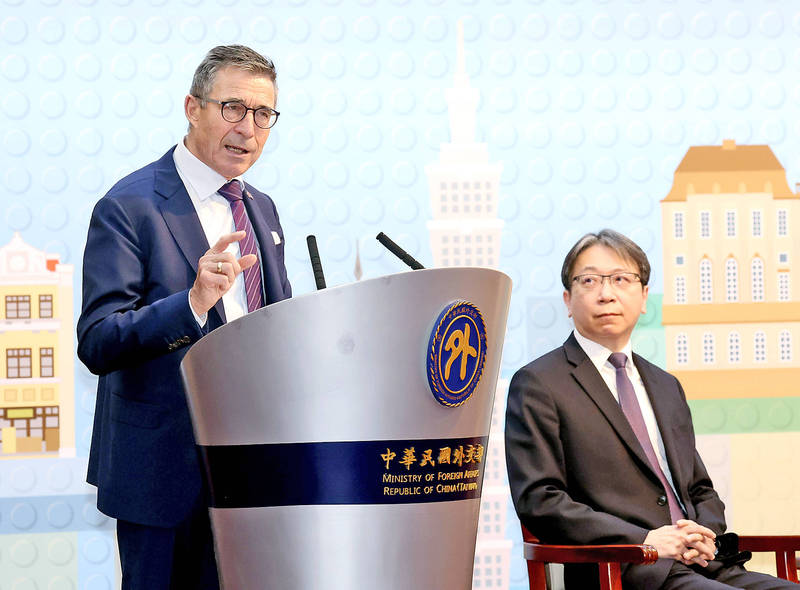《TAIPEI TIMES》Europe could do more to ’deter attack’ on Taiwan

Former NATO secretary-general Anders Fogh Rasmussen, left, speaks to the media in Taipei yesterday as Deputy Minister of Foreign Affairs Tsai Ming-yen looks on. Photo: CNA
‘ACT DETERMINEDLY’: Weapons supplies and a pledge of sanctions would show Beijing that it would be cut off from the global economy and isolated, a former NATO head said
By Shelley Shan / Staff Reporter
European countries could help deter a Chinese attack on Taiwan by conducting military exercises with Taipei and joining the US in imposing sanctions against China, former NATO secretary-general and former Danish prime minister Anders Fogh Rasmussen said in Taipei yesterday.
“The most important supplier of weapons and military assistance to Taiwan will be the US. However, to prevent a possible Chinese attack against Taiwan, European countries could assist in different ways,” Rasmussen said.
“Joint training or military exercises could be an important tool in that respect. We have done so with Ukrainian troops, and we can do the same with servicemen and women from Taiwan,” he told a news conference. “The first and foremost European contribution could be to join the US in comprehensive and profound sanctions against China.”
While Rasmussen said he does not see NATO as an actor in a conflict in the Taiwan Strait, he said it should react determinedly if China were to attack Taiwan.
“We should replace ‘strategic ambiguity’ with ‘strategic clarity,’” he said. “We should deliver military assistance to Taiwan to make Taiwan capable of defending itself.”
“We should make clear to China that [an invasion of Taiwan] would provoke profound and comprehensive economic sanctions” that would “cut off China from the global economic system,” Rasmussen said.
“The cost of invading Taiwan would be so high that the leadership in Beijing would think at least twice,” he said, adding that all the allies of Taiwan, including European countries, could play a central role.
Despite an escalation of tensions across the Taiwan Strait, Rasmussen said the world has yet to pay sufficient attention to the problem.
Tensions between China and Taiwan have global repercussions, and there should be global interest in preventing these tensions from escalating into an armed conflict, he said.
Rasmussen said that Russia’s war in Ukraine is a wake-up call to many, and has led to a change of mentality in Europe.
“We have built a Europe based on security provided by the US, cheap goods from China and cheap gas from Russia. I think most Europeans realize that the model with which we have built our society so far does not work any longer and must be changed,” he said. “We will have to prepare Europeans for the change, in which we will not be able to rely on a supply chain from China.”
Rasmussen also said that global corporations should not engage too closely with autocrats.
“We are approaching a new world order, where increased tensions between a China-led autocratic camp and a US-led democratic camp would become inevitable in the coming years. They [corporations] would have to choose between the two camps, and engaging with autocrats would be a risky business,” he said.
As for lessons learned from the Ukraine war, Rasmussen said the world “underestimated the ambitions and brutality of [Russian President] Vladimir Putin” and “overestimated the strength of the Russian military.”
Autocrats such as Putin “respect firmness and unity among democratic allies, and we should not repeat this mistake by being too weak and accommodating when it comes to China,” he said. “We must be firm in our response to autocrats.”
NATO allies can cooperate with Taiwan to exchange knowledge, experience and cybersecurity intelligence, and all can together explore the use of advanced technology in military systems and equipment, he said.
Rasmussen’s Alliance for Democracies Foundation has proposed a mechanism similar to Article 5 of NATO’s founding treaty, to urge all democracies to aid each other when one is exposed to economic coercion from China.
Under “Economic Article 5,” Taiwan, Lithuania, Australia and other countries that have experienced such coercion would increase trade and investment with allied countries, he said.
Expanding NATO to include Asia-Pacific countries would not be an effective way to address the challenges in the Indo-Pacific region, he said.
It is more important to develop multilateral defense cooperation, such as the Quadrilateral Security Dialogue between Australia, India, Japan and the US, and the AUKUS security pact between Australia, the UK and the US.
新聞來源:TAIPEI TIMES



















